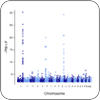
RESEARCH
GENOTYPE-PHENOTYPE ANALYSIS

Many military-relevant diseases or ailments, such as post-traumatic stress disorder, are associated with genetic risk factors. We use computational algorithms and high-performance computing resources to analyze genotyping or sequencing data and infer hidden associations between diseases and single-nucleotide polymorphisms (SNPs) and/or interactions among SNPs, and build statistical models that predict phenotypes from genotypes. The knowledge gained by these data-driven analyses can yield improved treatment or prevention strategies.
Software
Publications
Woo, H. J., and J. Reifman. Genetic interaction effects reveal lipid-metabolic and inflammatory pathways underlying common metabolic disease risks. BMC Medical Genomics. 2018 June 20; 11:54. [PDF, PubMed]
Woo, H. J., and J. Reifman. Collective interaction effects associated with mammalian behavioral traits reveal genetic factors connecting fear and hemostasis. BMC Psychiatry. 2018 June 5; 18:175. [PDF, PubMed]
Yu, C., H. J. Woo, X. Yu, T. Oyama, A. Wallqvist, and J. Reifman. A strategy for evaluating pathway analysis methods. BMC Bioinformatics. 2017 October 13; 18:453. [PDF, PubMed]
Woo, H. J., C. Yu, K. Kumar, and J. Reifman. Large-scale interaction effects reveal missing heritability in schizophrenia, bipolar disorder and posttraumatic stress disorder. Translational Psychiatry. 2017 April 11; 7:e1089. [PDF, PubMed]
Woo, H. J., C. Yu, and J. Reifman. Collective genetic interaction effects and the role of antigen-presenting cells in autoimmune diseases. PLOS ONE. 2017 January 12; 12(1):e0169918. [PDF, PubMed]
Woo, H. J., C. Yu, K. Kumar, B. Gold, and J. Reifman. Genotype distribution-based inference of collective effects in genome-wide association studies: insights to age-related macular degeneration disease mechanism. BMC Genomics. 2016 August 30; 17:695. [PDF, PubMed]